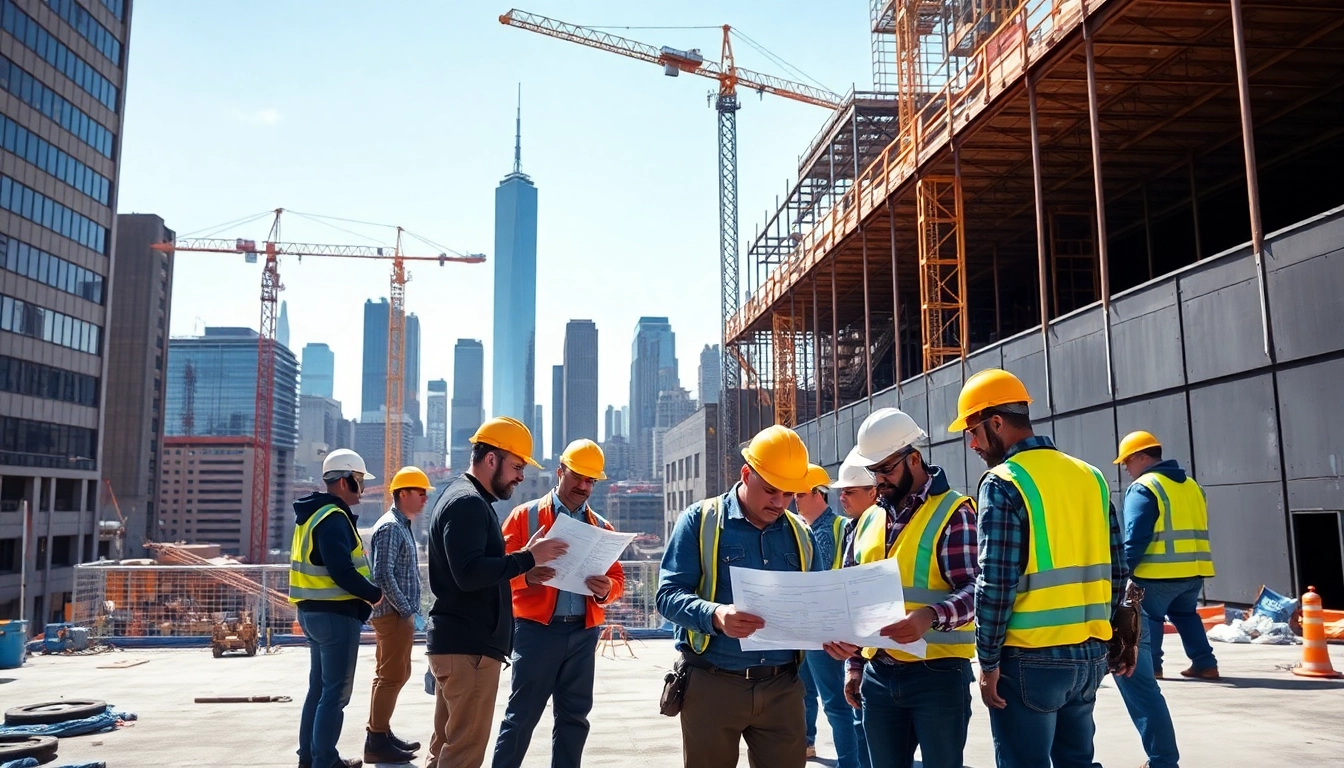Understanding the Role of a New York City Commercial General Contractor
Definition and Responsibilities
A New York City Commercial General Contractor serves as the primary contractor responsible for overseeing a construction project from inception to completion. This role encompasses not only project management but also coordination and collaboration among various stakeholders, including architects, engineers, and subcontractors. A general contractor ensures that a project adheres to its budget, timeline, and specifications, acting as the central point of contact and authority.
Responsibilities include obtaining necessary permits, managing procurement processes, scheduling work, and ensuring compliance with building codes and safety regulations. Furthermore, general contractors handle the financial aspects of a project, such as budgeting and cost estimation, which is crucial in the fast-paced and often variable construction industry.
Benefits of Hiring a General Contractor
Hiring a general contractor offers numerous advantages for project owners. One prominent benefit is seamless project management; general contractors bring expertise in scheduling and resource allocation, ensuring that various project components progress on time. This not only keeps the project moving but also minimizes potential delays and disruptions.
Another key benefit is access to a network of reliable subcontractors. General contractors often have long-standing relationships with skilled tradespeople, which can lead to better pricing and quality work. Additionally, they possess expertise in navigating local regulations and permitting processes, alleviating burdens on project owners.
Key Differences from Subcontractors
While both general contractors and subcontractors play vital roles in construction projects, their functions differ markedly. A general contractor is responsible for the entire project, acting as the project’s overseer, while subcontractors specialize in specific trades, such as plumbing, electrical work, or HVAC installation. Subcontractors typically work under the contract of the general contractor, who allocates tasks and coordinates their efforts to ensure smooth project execution.
Evaluating Your Project Needs with a New York City Commercial General Contractor
Assessing Project Scope and Budget
Before embarking on a construction project, it is critical to thoroughly assess the project’s scope and budget. This evaluation should encompass project goals, desired outcomes, and any aesthetic or functional requirements. Collaborating with a New York City Commercial General Contractor can help clarify these objectives and refine the overall vision.
Budgeting is equally important; it entails estimating costs for materials, labor, permits, and unexpected contingencies. A well-prepared budget not only provides clear expectations but also guides decision-making throughout the project lifecycle.
Types of Projects Typically Managed
New York City Commercial General Contractors manage a diverse range of projects, including office buildings, retail spaces, educational institutions, and industrial facilities. Each project type presents unique challenges and requirements. For instance, commercial office spaces demand careful consideration of layout and collaboration areas, while retail environments often require quick turnaround times to accommodate market trends.
Understanding the specific nuances of these different project types allows general contractors to tailor their strategies effectively to meet client needs, adapt to project-specific challenges, and deliver quality results.
Timeline Expectations and Scheduling
Timeline expectations play a crucial role in project planning. A well-constructed schedule outlines key milestones and deadlines, ensuring all parties are aligned. General contractors use sophisticated scheduling tools to map out timelines that account for labor availability, weather conditions, and other unforeseen delays.
Establishing a timeline also fosters transparency and accountability among stakeholders, driving collective effort toward meeting project goals. A general contractor’s ability to manage schedules efficiently can significantly impact a project’s success or failure.
Qualities of an Effective New York City Commercial General Contractor
Critical Communication Skills
Effective communication is one of the foremost qualities of a successful general contractor. The construction process involves numerous stakeholders, and clear, concise communication helps mitigate misunderstandings and conflicts. From initial consultations to daily site meetings, the contractor must relay information accurately and promptly to maintain alignment among all parties.
Additionally, listening skills are equally important, as understanding client needs and concerns fosters trust and collaboration throughout the project.
Experience and Industry Knowledge
An effective general contractor possesses extensive industry knowledge and experience. Familiarity with construction techniques, materials, and local regulations is essential for navigating the intricacies of construction projects. Furthermore, seasoned contractors are adept at identifying potential issues before they escalate, often suggesting proactive solutions to mitigate risks.
Industry knowledge also extends to understanding market trends and innovative practices, providing added value to clients seeking modern solutions.
Reputation and Client Reviews
The contractor’s reputation in the industry and among clients stands as a testament to their ability to deliver on promises. Positive client reviews and testimonials can significantly impact a contractor’s ability to secure future projects. Evaluating past work, seeking references, and analyzing customer feedback can help potential clients make informed decisions when selecting a general contractor.
A solid reputation not only suggests reliability but also reflects a commitment to quality and customer satisfaction, encouraging future business opportunities for the contractor.
Steps to Source and Select a New York City Commercial General Contractor
Researching and Shortlisting Candidates
The selection process for a New York City Commercial General Contractor begins with thorough research. Potential clients should compile a list of candidates based on their experience, expertise, and project portfolios. Resources include online directories, industry networks, and referrals from colleagues and trusted sources.
Shortlisting candidates involves analyzing their qualifications, specializations, and past project performances. Clients might also consider certifications, licenses, and insurance coverage to ensure compliance with industry standards.
Conducting Interviews and Reference Checks
Following the shortlisting process, conducting interviews is critical to gaining insights into each contractor’s approach, compatibility, and problem-solving capabilities. This stage provides an opportunity to discuss project specifics, timelines, and budget considerations. Asking targeted questions can reveal how the contractor handles challenges and communicates with clients and subcontractors.
Further, performing reference checks is essential to verify past project performance. Speaking with former clients or subcontractors can illuminate a contractor’s strengths and weaknesses, providing clarity on their work ethic and reliability.
Understanding Contractual Obligations
Once a candidate is selected, understanding contractual obligations becomes paramount. Contracts should clearly outline the scope of work, payment terms, project timelines, and responsibilities of all parties involved. This clarity minimizes potential disputes and sets expectations for performance.
Clients should also familiarize themselves with legal and compliance aspects, ensuring that the contract adheres to local laws and regulations. Hiring a legal expert to review contracts can safeguard interests and enhance security throughout the project’s lifespan.
Best Practices for Working with Your New York City Commercial General Contractor
Establishing Clear Communication Channels
Establishing clear communication channels is fundamental to successful collaboration with a general contractor. Regular updates, progress meetings, and open lines of communication help clarify expectations and address concerns as they arise. Utilizing project management software can further streamline communication and documentation, ensuring that all stakeholders remain informed.
Monitoring Progress and Quality Control
Monitoring progress and implementing quality control measures are vital components of effective project management. Clients should perform regular site visits and engage in discussions regarding work standards and milestones. A proactive approach to quality assurance can catch potential issues early, allowing for timely resolutions that maintain project integrity.
Additionally, establishing benchmarks and performance metrics can enhance accountability and ensure that the project remains on track and within budget.
Handling Changes and Problem-Solving
Flexibility and adaptability are essential when managing construction projects, as changes often arise during the process. A willingness to handle modifications constructively fosters a positive working relationship. Clients should engage openly with their general contractor about any changes to the original plan, discussing the implications and exploring solutions collaboratively.
Implementing a systematic approach to problem-solving equips both parties with the tools to navigate challenges effectively, enhancing project outcomes and satisfaction.



